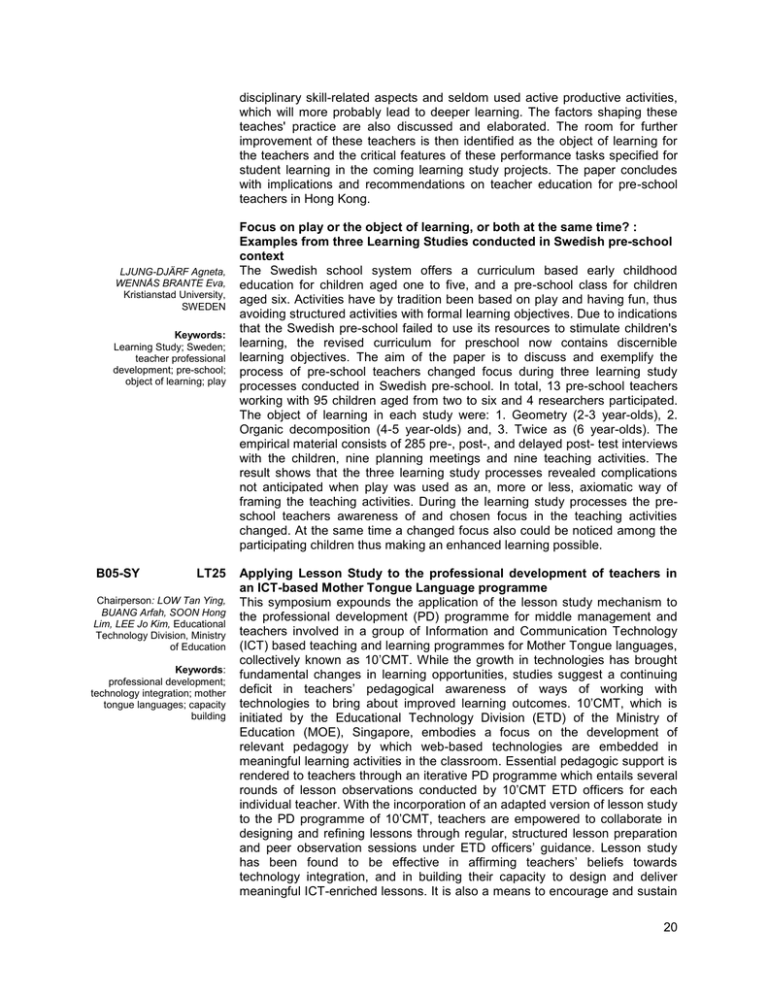20 disciplinary skill-related aspects and seldom used active
advertisement

disciplinary skill-related aspects and seldom used active productive activities, which will more probably lead to deeper learning. The factors shaping these teaches' practice are also discussed and elaborated. The room for further improvement of these teachers is then identified as the object of learning for the teachers and the critical features of these performance tasks specified for student learning in the coming learning study projects. The paper concludes with implications and recommendations on teacher education for pre-school teachers in Hong Kong. LJUNG-DJÄRF Agneta, WENNÅS BRANTE Eva, Kristianstad University, SWEDEN Keywords: Learning Study; Sweden; teacher professional development; pre-school; object of learning; play B05-SY LT25 Chairperson: LOW Tan Ying, BUANG Arfah, SOON Hong Lim, LEE Jo Kim, Educational Technology Division, Ministry of Education Keywords: professional development; technology integration; mother tongue languages; capacity building Focus on play or the object of learning, or both at the same time? : Examples from three Learning Studies conducted in Swedish pre-school context The Swedish school system offers a curriculum based early childhood education for children aged one to five, and a pre-school class for children aged six. Activities have by tradition been based on play and having fun, thus avoiding structured activities with formal learning objectives. Due to indications that the Swedish pre-school failed to use its resources to stimulate children's learning, the revised curriculum for preschool now contains discernible learning objectives. The aim of the paper is to discuss and exemplify the process of pre-school teachers changed focus during three learning study processes conducted in Swedish pre-school. In total, 13 pre-school teachers working with 95 children aged from two to six and 4 researchers participated. The object of learning in each study were: 1. Geometry (2-3 year-olds), 2. Organic decomposition (4-5 year-olds) and, 3. Twice as (6 year-olds). The empirical material consists of 285 pre-, post-, and delayed post- test interviews with the children, nine planning meetings and nine teaching activities. The result shows that the three learning study processes revealed complications not anticipated when play was used as an, more or less, axiomatic way of framing the teaching activities. During the learning study processes the preschool teachers awareness of and chosen focus in the teaching activities changed. At the same time a changed focus also could be noticed among the participating children thus making an enhanced learning possible. Applying Lesson Study to the professional development of teachers in an ICT-based Mother Tongue Language programme This symposium expounds the application of the lesson study mechanism to the professional development (PD) programme for middle management and teachers involved in a group of Information and Communication Technology (ICT) based teaching and learning programmes for Mother Tongue languages, collectively known as 10’CMT. While the growth in technologies has brought fundamental changes in learning opportunities, studies suggest a continuing deficit in teachers’ pedagogical awareness of ways of working with technologies to bring about improved learning outcomes. 10’CMT, which is initiated by the Educational Technology Division (ETD) of the Ministry of Education (MOE), Singapore, embodies a focus on the development of relevant pedagogy by which web-based technologies are embedded in meaningful learning activities in the classroom. Essential pedagogic support is rendered to teachers through an iterative PD programme which entails several rounds of lesson observations conducted by 10’CMT ETD officers for each individual teacher. With the incorporation of an adapted version of lesson study to the PD programme of 10’CMT, teachers are empowered to collaborate in designing and refining lessons through regular, structured lesson preparation and peer observation sessions under ETD officers’ guidance. Lesson study has been found to be effective in affirming teachers’ beliefs towards technology integration, and in building their capacity to design and deliver meaningful ICT-enriched lessons. It is also a means to encourage and sustain 20


